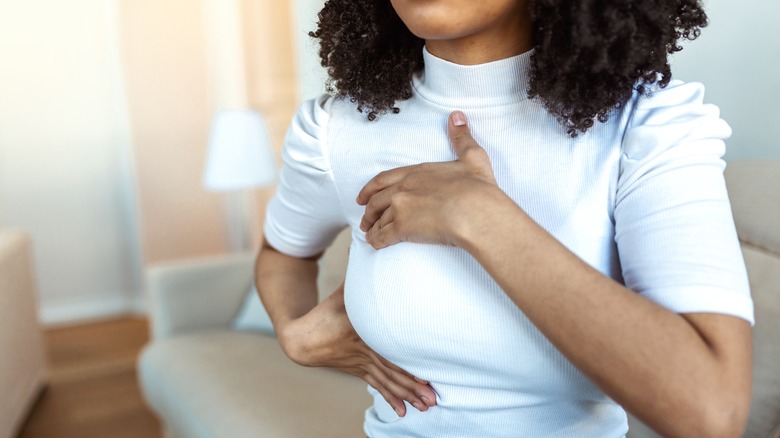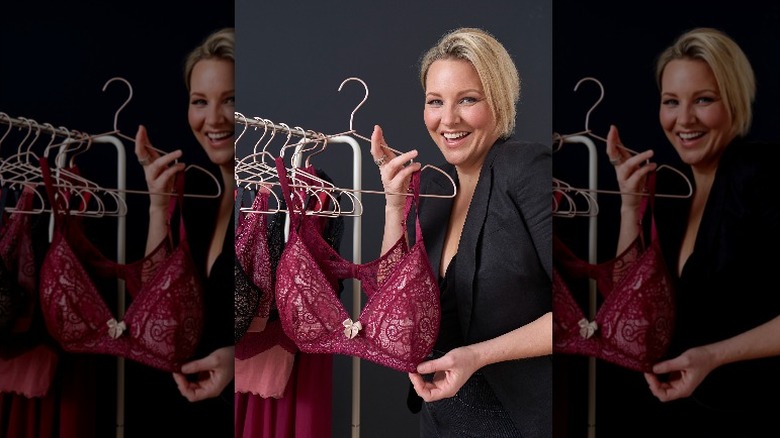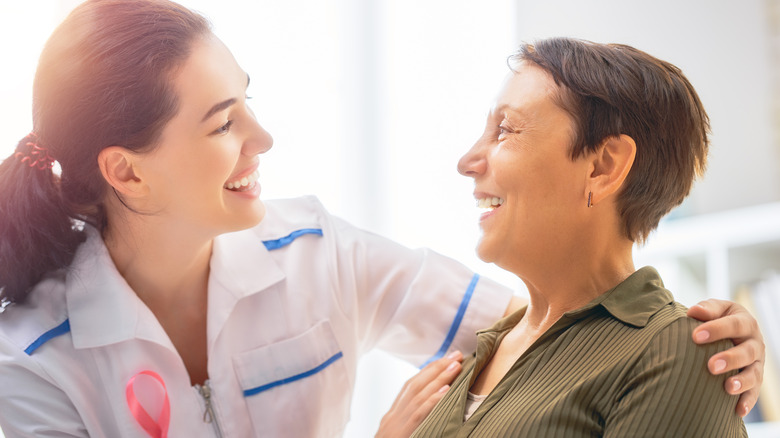Breast Cancer Survivor Unpacks How Sharing Your Story Can Demystify The Disease
First Lady Betty Ford was diagnosed with breast cancer in September 1974, a month after her husband became president, via National Archives. Two days after the lump in her breast was found, she underwent a mastectomy, and she didn't keep quiet about it; she let the media take photos while she was in the hospital and gave interviews about her diagnosis, per Cancer Today. In a speech she gave in 1975 to the American Cancer Society, she talked about being in a position many women had probably experienced ' feeling fine one day and facing a cancer diagnosis the next. Ford speaking about her cancer diagnosis prompted a noticeable uptick in women getting breast cancer screenings. Ford acknowledged why it could be scary to talk about breast cancer: "Too many women are so afraid of breast cancer that they endanger their lives. These fears of being 'less' of a woman are very real, and it is very important to talk about the emotional side effects honestly."
Just over 10 years later, Ford attended the first event for what would become Breast Cancer Awareness Month, per Brevard Health Alliance. It's now a global initiative in the month of October to help people better understand the impact of breast cancer. But even after nearly 50 years, there's still some taboos around talking about breast cancer. The List spoke exclusively with Dana Donofree, breast cancer survivor and founder and CEO of AnaOno, about the importance of talking about breast cancer.
Dana Donofree wasn't prepared for how breast cancer would impact her
Dana Donofree is founder and CEO of AnaOno, which makes lingerie and loungewear for boobs of all types, particularly — but not exclusively — for women who have had breast cancer treatment. There are different bra needs for women who've undergone breast cancer treatment, like surgery and radiation. Donofree was diagnosed with breast cancer at the age of 27, and she lost both her breasts to the disease. "I knew about breast cancer when I was diagnosed at 27," Donofree told The List, "but I didn't really 'know' about breast cancer." Donofree outlined some of what she thought at first in regards to breast cancer: "I thought I could lose my hair, I may be tired, who would know if I would live or not."
She then explained what she hadn't been ready for: "What it felt like to live without breasts, or nipples. What it really meant to amputate my breasts to save my life and what that would do to me emotionally, mentally, and physically."
The more people talk about breast cancer, the less alone people will feel
The physical changes that happen during and after breast cancer treatment may be easier to see, but there's clearly an emotional and psychological impact to breast cancer, per National Library of Medicine. And it's important to talk about that. "So many conversations regarding women's health have been 'taboo' for too long," Dana Donofree told The List. "We spent decades suppressing our real lived experiences, speaking out about the health challenges we face as cis-women, and what we should be educating and informing our next generations about."
Speaking out about what life is like after a breast cancer diagnosis has clear benefits for Donofree. It's a way "to give support of the next generation of breast cancer patients so they don't feel so alone," Donforee said. "The more we talk about taboo subjects, the LESS taboo they become!"
The fear of a potential breast cancer diagnosis has stopped or delayed some women from going to the doctor, via U.S. News & World Report. One recent example of the benefits to talking candidly about breast health comes with Angelina Jolie; upon discovering she had a breast cancer-causing genetic mutation in 2013, she had a preventive double mastectomy. And after the news broke, genetic testing and counseling doubled and remained high, per BMJ.


